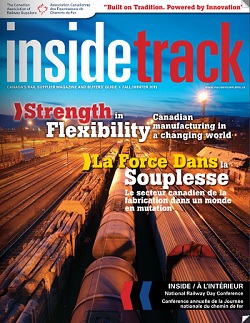Make the Members’ Voice Heard and Never Stop Moving

Sylvia Newell, Executive Director, Canadian Association of Railway Suppliers (CARS) and former Vice President of the League of Railway Industry Women (LRIW), is an innovation engine who draws from a wide variety of work experiences to keep her organization, industry and causes on the right track.

![]()
Everyone has to start somewhere. Where you start isn’t important. How you start and what you do to get there is what matters.
Being stagnant is not an option.
We need to be a conduit for our members so government officials are aware of our industry’s importance to Canada’s global competitiveness.
Studies show that women in leadership make organizations more fluid and facilitate getting business done faster and more efficiently.
Association Adviser: Sylvia, tell us a little about CARS.
Sylvia Newell: CARS was originally founded by a group of manufacturers in the 1970s. The purpose of starting the group was to support the railways in their advocacy efforts and come together as one unified voice for government. CARS was officially incorporated in 1991 and represents companies selling products and services to the railways and transit authorities. Our membership consists of 134 companies engaged not only in selling products such as locomotive and freight components, but also in track equipment and a variety of professional services. A number of our members offer engineering, consulting, legal and insurance services.
AA: Is CARS’ membership growing?
SN: As a result of some of the value-added services we provide, CARS has heightened its profile and has really made a name for itself as a leading industry association. Our membership is at its largest [level ever] and it continues to grow on a weekly basis. In the past, our membership consisted [primarily] of freight suppliers. However in the last two years, we have seen tremendous growth in the number of transit suppliers. Both freight and transit are vital to our country and we continue to see it grow domestically and globally. Rail continues to evolve and to be innovative. It will enable Canada to remain competitive in global markets
AA: Sylvia, tell us more about your recent advocacy efforts?
SN: It’s extremely important to make every effort to establish relations with government. CARS has a government relations committee that consists of members from both the transit and the freight business. We meet on a regular basis to discuss issues that are relevant to our industry. Our association takes the lead on organizing meetings with key officials to provide our members with an opportunity to discuss and educate government about our industry. It is imperative that CARS provides a unified voice for the railway and transit supply industry.
AA: Why has advocacy become so important for the modern association?
SN: As an association, we need to be a conduit for our members and to ensure that government officials are aware of the importance of our industry. A commitment to advocacy will open more doors and will provide more opportunities for our members. On issues relating to transportation policy, the environment, railway infrastructure, tax revisions and targeted funding, we need to be included in these and other relevant conversations.
AA: Do you have any examples of advocacy in action?
SN: Sure. March 9th and 10th was CARS Rail Day on the Hill—that’s how we refer to Parliament. This was an opportunity for our association to present key issues about our industry and to learn more about the federal government plans that could lead to business opportunities for our members. The Minister of Infrastructure and Communities and also the Minister of Transport stressed how important it was that our messages were delivered by an association of our magnitude as one unified voice. They were very interested not only in learning what was most important to us, but what was NOT important.
AA: Is there such a thing as a typical CARS member?
SN: Not really. As I mentioned earlier, membership used to be primarily freight suppliers, but we’ve recently gained many transit suppliers and we are finding more and more variety within our membership. Even companies that don’t have a footprint in our industry are joining and they would like to use our association as an avenue to get there.
AA: Have how your earlier roles in software development, membership development and administration prepared you for your current role at CARS?
SN: Different roles require different skill sets and goals. It’s important to keep building on that and setting new goals. Everyone has to start somewhere. Where you start isn’t important; it’s how you start and what you do to get there that matters. Being stagnant is not an option. I embrace challenges and I think they are extremely important and necessary to grow professionally and personally. Each one of my past roles has given me different tools and knowledge that I am so grateful for today. This has resulted in tremendous growth for the association in areas like membership, revenue and value – added services.
AA: Sylvia. You were very involved at an organization for female railway industry professionals. Is the industry moving to more gender balance in top management?
SN: The railway industry is predominately male; however, women are beginning to have a stronger presence. Studies have shown having women in leadership roles or on boards of directors provides more fluidity and is more productive for an organization because business is executed more quickly and efficiently.
AA: What have been some of the biggest surprises for you since taking over the helm of CARS two years ago?
SN: I’m not sure if there have been any “surprises.” There have been several times that we exceeded our expectations and goals. We had a strategic directions meeting in 2014 and implemented a three-year plan. I’m pleased to say we met every goal we set—and did so in only one year. That was a very proud moment for CARS.
AA: What’s a typical workday (or week) like for you?
SN: There are only two of us in the office. We take care of everything from government relations to events to member services. Needless to say we are extremely busy. Much of my time is spent in meetings that are relevant to our industry and on planning ahead, and ensuring that members receive opportunities to grow their business and have a voice that will represent them at the government level.
AA: What are biggest challenges faced by your members and how is CARS helping them?
SN: Our industry is facing a serious skills shortage and it’s about to become worse with half of our industry retiring in the next couple of years. CARS is working with member companies to provide a unified voice and to deliver clear messages to government. We need to work together and come up with solutions that will assist us in funding programs and training new employees
AA: Do have special strategies for connecting with your NextGen members, staff and volunteers?
SN: They need to get engaged and participate in the direction of our association by joining a committee. Also, we’ll soon be introducing a scholarship program for CARS members (or members’ families) to invest in education in the railway industry or to improve their own knowledge of the railway industry. Ideally, we like the scholarship to go to someone who is younger and going through training in the railway industry. We need to do everything we can to make the railway industry as sexy and appealing to the next generation as possible.
AA: How would you describe your leadership style?
SN: I have somewhat of a democratic leadership style. Although I am aware of my position and what my responsibilities are as a leader, I am also aware that I wouldn’t be the leader I am without the support of my staff. Having a strong foundation is extremely important to any institution.
AA: What do you like most about working in the association world?
SN: The association world is extremely dynamic – right from the people you meet to the issues you tackle. There are many different branches that stem out from an association that require equal attention. The diversity and the opportunities to learn are endless.

AA: What are the most important member communication vehicles for CARS?
SN: Our most important communication vehicle is our daily Inside Track news brief that goes out every weekday morning. It consists of up to date information and articles about our industry, as well as business opportunities and job opportunities. Of course, we have our website and our semi-annual member magazine, also called Inside Track, that’s published in partnership with Naylor.
AA: Which have been your most successful sources of non-dues revenue?
SN: CARS has organized two successful annual events over the past two years. One is our golf tournament that takes place every September at Beaconsfield Golf Course in Montreal. This is a beautiful private club that we have had the privilege of playing on. It’s an opportunity to have a casual networking event and fun at the same time. Second is our National Railway Day Conference, which takes place every November to commemorate National Railway Day in Canada. This event brings together suppliers, railways and government and provides an opportunity to learn about relevant topics in our industry. This year’s focus will be on innovation and technology.
AA: It sounds like CARS has been busy in the innovation front. Does your organization have a formal process for bringing new ideas to the table?
SN: We have several committees within the association that help with areas like membership, marketing, government relations, international trade and now scholarships. If there is a new idea that can possibly provide value to membership, it will be presented to the board of directors and voted on.
AA: If you had an unexpected 50 percent budget increase, how would you spend it?
SN: I would spend it on staff and industry resources.
AA: What’s keeping you up at night?
SN: Thinking about what’s next. How do we get to the next level?

